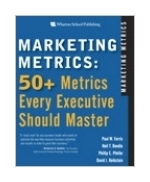Todays best marketers recognize the central importance of metrics, measurement, and
accountability. But few marketers recognize the extraordinary range of metrics now
available for evaluating their strategies and tactics. In 50 Metrics Every Marketer Must
Know, four leading researchers and consultants systematically introduce todays most
powerful marketing metrics. The authors show how to use a dashboard of metrics to view
market dynamics from various perspectives, maximize accuracy, and triangulate to optimal
solutions. Their comprehensive coverage includes measurements of promotional strategy,
advertising, and distribution; customer perceptions; market share; competitors power;
margins and profits; products and portfolios; customer profitability; sales forces and
channels; pricing strategies; and more. Youll learn how and when to apply each metric, and
understand tradeoffs and nuances that are critical to using them successfully. The authors
also demonstrate how to use marketing metrics as leading indicators, identifying crucial
new opportunities and challenges. For clarity and simplicity, they avoid advanced
arithmetic: all calculations can be performed by hand, or with basic spreadsheet
techniques. In coming years, few marketers will rise to senior executive levels without
deep fluency in marketing metrics. This book is the fastest, easiest way to gain that
fluency and stand out from the crowd in an ever more challenging environment.
Table of Contents
Acknowledgments xi
About the Authors xiii
Foreword xv
Chapter 1: Introduction
Chapter 2: Share of Hearts, Minds, and Markets
Chapter 3: Margins and Profits
Chapter 4: Product and Portfolio Management
Chapter 5: Customer Profitability
Chapter 6: Sales Force and Channel Management
Chapter 7: Pricing Strategy
Chapter 8: Promotion
Chapter 9: Advertising Media and Web Metrics
Chapter 10: Marketing and Finance
Chapter 11: The Marketing Metrics X-Ray
Author
Paul W. Farris is Landmark Communications Professor and Professor of Marketing at The
Darden Graduate Business School, University of Virginia, where he has taught since 1980.
Professor Farris research has produced award-winning articles on retail power and
measurement of advertising effects. He has published many marketing articles in
publications such as the Harvard Business Review, Journal of Marketing, Journal of
Retailing, and Marketing Science. Farris is currently working on methods for integrating
and improving marketing metrics. He is author or co-author of several books, including
Advertising Budgeting: A Report from the Field. Farris consulting clients range from
Procter and Gamble, to Apple and IBM. Before moving to Virginia, he taught marketing at
the Harvard Business School and also has worked in product management for Unilever,
Germany and account management for the LINTAS advertising agency. He is a current and past
board member for several U.S and international companies.
Neil T. Bendle is a Ph.D. student in marketing at the Carlson School of Management,
University of Minnesota. He holds an MBA from Darden, and has nearly a decades experience
in marketing management, consulting, business systems improvement, and financial
management. Bendle was responsible for measuring the success of marketing campaigns for
the UKs Labour Party.
Phillip E. Pfeifer, Alumni Research Professor of Business Administration at The Darden
Graduate Business School, currently specializes in interactive marketing. He has published
a popular MBA textbook and over 25 refereed articles in journals such as the Journal of
Interactive Marketing, Journal of Database Marketing, Decision Sciences, and the Journal
of Forecasting. Pfeifer was recognized in 2004 as the Darden Schools faculty leader in
external case sales. His teaching has won student awards and been recognized inBusiness
Weeks Guide to the Best Business Schools. His recent clients include Circuit City, Procter
and Gamble, and CarMax.
David J. Reibstein is the William Stewart Woodside Professor and Professor of Marketing at
the Wharton School. His research focuses on marketing metrics and their link to financial
consequences, competitive marketing strategy, market segmentation, brand choice, and
product line breadth. He has been published in every major marketing journal and has
authored or co-authored numerous books. He served as the Executive Director of the
Marketing Sciences Institute, and co-founded Whartons CMO Summit. Reibstein architected
and teaches the Wharton Executive Education course on marketing metrics. He consults with
leading businesses, including GE, Shell Oil, HP, Novartis, Johnson and Johnson, Merck, and
Major League Baseball. He has served as Vice Dean and Director of Whartons Graduate
Division, as visiting professor at Stanford and INSEAD, and as faculty member at Harvard.
Reibstein was the co founder of Shopzilla, one of the first product search engines, and
serves on several corporate boards.
389 pages


